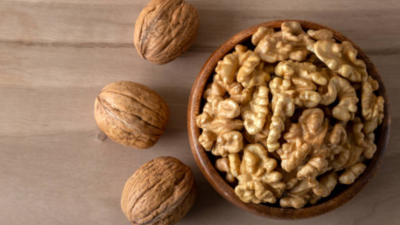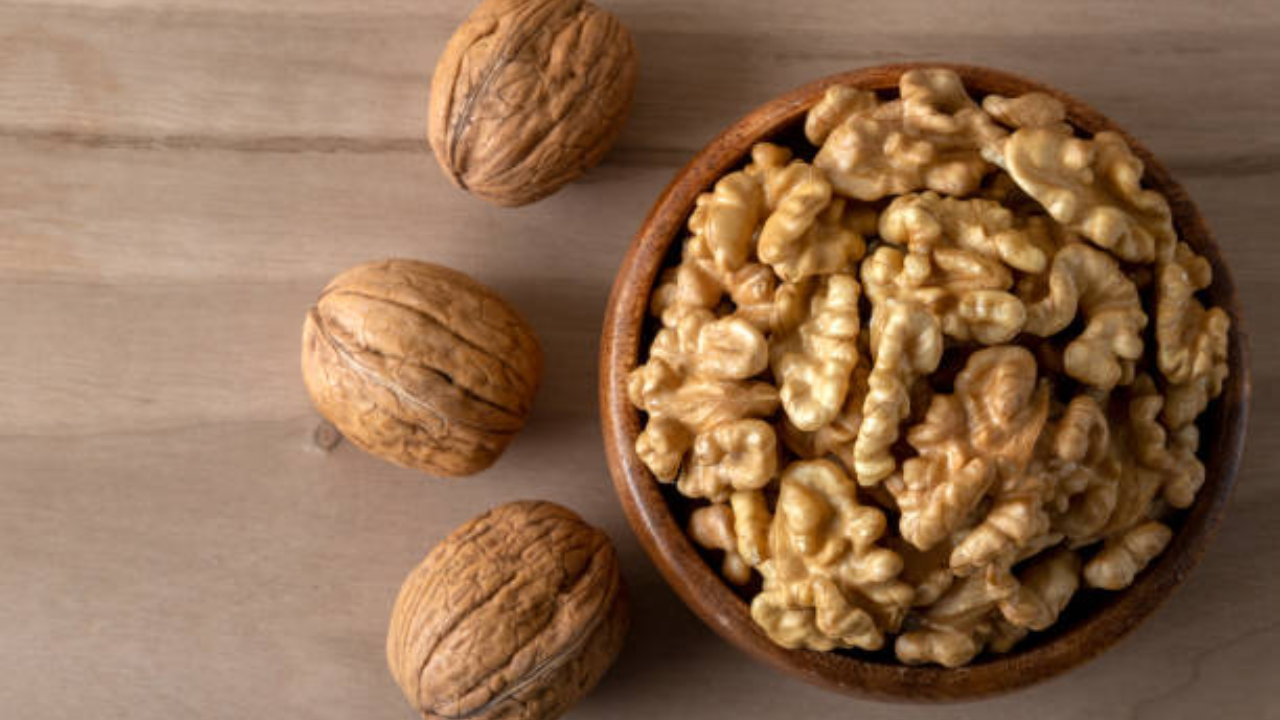Walnuts are at their nutritional peak when they are soaked. It is a healthy and age-old practice in several households to soak walnuts along with other dry fruits overnight and consume them first thing in the morning. But what to soak walnuts in always remains a curious question? Soaking walnuts can enhance their nutritional benefits, but whether to soak them in water or milk can depend on specific health goals and dietary needs.
Raw walnuts contain phytic acid, a compound that binds to essential minerals like calcium, magnesium, and iron, potentially hindering the body’s ability to absorb these nutrients. By soaking walnuts, the content of phytic acid goes down, making the nutrients more bioavailable and easier to digest. The nuts also become softer by soaking, hence softer on the digestive system. Apart from this, walnuts contain omega-3 fatty acids, antioxidants, and proteins that work well for the brain, heart, and general well-being of a person.
Soaking walnuts in water helps activate the enzymes
Water is the traditional method for soaking nuts, including walnuts, and is particularly helpful if you’re aiming to minimize calories while enhancing digestibility.
Soaking walnuts in water
helps activate the enzymes that aid in digestibility and nutrient absorption without adding any extra calories or substances. This makes it an excellent choice for those who prefer a minimalistic, whole-food approach to nutrition. Water doesn’t interfere with the walnut’s natural nutrient profile, preserving all its original benefits.
Water doesn’t add any calories or fat, which makes it an ideal choice for those who are watching their weight. Walnuts are already packed with healthy fats, so for those on calorie-restricted diets, soaking in water will help you get to eat your walnuts with their purest form, free from extra calories from additives such as milk.
Soaking walnuts in water is easy to digest and less likely to bring about bloating or discomfort. It is also appropriate for people with lactose intolerance or milk allergies, since there will not be a threat of side reaction from the substance.
To soak walnuts in water, it is as simple as putting them in a bowl for approximately 4 to 6 hours. You then need to rinse them well after soaking, to remove the residue or phytic acid that may have been leached out.
Soaking walnuts in milk gives it a creamy texture
Soaking in milk makes the walnut creamy and tastes richer. Those who want a somewhat more flavorful snack may prefer them soaked in milk. Milk is healthy on its own; therefore, soaking walnuts in milk passively gives it extra nutrition.
For instance, milk is rich in calcium, protein, and vitamin D, which are not significantly found in a walnut. Walnuts are therefore soaked in milk for greater benefits to people requiring extra calcium or protein. This supplementation makes walnuts support bone health, muscle growth, and overall well-being, especially in people with higher protein requirements such as athletes or the elderly.
You can add sweetened alternatives to make it taste different, with less sugar, using almond or coconut milk, for instance.
Milk-soaked walnuts can keep you full for longer due to the extra protein and fat in milk. This makes it a great option for people who need sustained energy, such as those with a long gap between meals. The combination of healthy fats, protein, and fiber from walnuts keeps blood sugar levels stable, which can reduce cravings and energy slumps.
However, milk-soaked walnuts might not be suitable for everyone. People who are lactose intolerant or allergic to milk should avoid this method. If you are lactose intolerant but still want the creaminess of milk-soaked walnuts, using plant-based milk alternatives (like almond, soy, or oat milk) can offer a similar texture without lactose.
To soak walnuts in milk, follow the same process as with water but allow the walnuts to sit in the milk for 4 to 6 hours in the refrigerator. You can consume the milk afterward as well, making it a refreshing drink rich in walnut flavor and nutrients.
Easy ways to increase your Vitamin D intake
Which is healthier?
The choice between soaking walnuts in water or milk depends on your individual health goals and dietary restrictions.
Water-soaked walnuts are a better choice because they don’t add any extra calories. This allows you to enjoy walnuts in their simplest form.
Milk-soaked walnuts offer the benefits of extra calcium, protein, and a creamier texture, making them a good option for those looking to support bone health or needing a more satisfying snack.
Water-soaked walnuts are likely to be gentler on the stomach and are suitable for people with lactose intolerance or milk allergies.
I’m Manas Ranjan Sahoo: Founder of “Webtirety Software”. I’m a Full-time Software Professional and an aspiring entrepreneur, dedicated to growing this platform as large as possible. I love to Write Blogs on Software, Mobile applications, Web Technology, eCommerce, SEO, and about My experience with Life.




